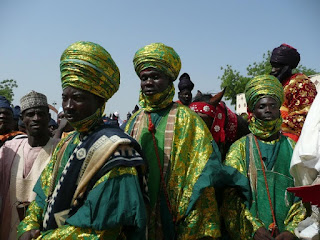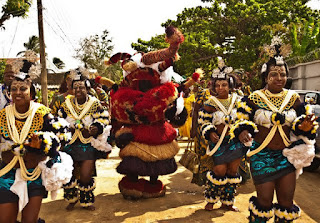ABOUT THE HAUSA PEOPLE
About the Hausa People
ORIGIN
The Hausa people are concentrated mainly in Northwestern
Nigeria and in adjoining southern Niger. This area is mostly semiarid grassland or Savanna, dotted with cities surrounded
by farming communities. The cities of this region—Kano, Sokoto, Zari, and
Katsina, for example—are among the greatest commercial Centers of sub-Saharan
Africa (Africa south of the Sahara Desert). Hausa people are also found living
in other countries of West Africa like Cameroon,
Togo, Chad, Benin, Burkina Faso, and Ghana.
Hausa is the most widely spoken language in West Africa. It is spoken by an estimated 22 million people. Another 17 million people speak Hausa as a second language. Hausa is written in Arabic characters, and about one-fourth of Hausa words come from Arabic. Many Hausa can read and write Arabic. Many can also speak either French or English.
Togo, Chad, Benin, Burkina Faso, and Ghana.
Hausa is the most widely spoken language in West Africa. It is spoken by an estimated 22 million people. Another 17 million people speak Hausa as a second language. Hausa is written in Arabic characters, and about one-fourth of Hausa words come from Arabic. Many Hausa can read and write Arabic. Many can also speak either French or English.
OCCUPATION
·
Architecture
·
Farming
& Hunting
FESTIVAL
Kallon
Kuwa: is a post-harvest youth cultural festival. Its name is derived
from Kallon Kowa which means "viewing for all" in Hausa. The festival
started around 1935 and takes place annually in various villages, including
Shinkafi, Dankanjiba, Dutsen Safe and Rimin Guza. It is held to express
happiness for the successful completion of the cropping season and to celebrate
the coming of "Kaka" - a time of prosperity in terms of abundant food
and increased economic and social activities.
Durbar festival: is an annual festival celebrated in several cities of Nigeria. This festival marks the end of Ramadan and is also shared with Id el Kabir and Id el Fitri, muslim holidays.
Durbar festival: is an annual festival celebrated in several cities of Nigeria. This festival marks the end of Ramadan and is also shared with Id el Kabir and Id el Fitri, muslim holidays.
Argungu Fishing Festival: is an annual four-day festival in The State of Kebbi, in the North-western part of Northern
Nigeria. The festival usually takes place in Argungu, the capital city of Argungu
Emirate Council. The region is made up of
fertile river areas (matanfada, mala, gamji), with much irrigation and orchards
(lambu in Hausa). The majority of fishermen are the followers of Islam and also
predominantly farmers. Kanta museum is the main historical centre in Argungu
for visitors across the globe. People from around the world travel to Argungu
just to witness the occasion. The main purpose of the Argungu fishing festival
is for fishing and unity.
TABOOS
i. Eating pork or
consuming swine products
ii. Alcohol is forbidden
ii. Wearing of gold and silk for men.
iv. Scantily-dressed or half-nude females
v. Depicting Prophet Muhammed in art form
vi. Sexual education and freedom prohibited
vii. Urinating in the upright position
ii. Alcohol is forbidden
ii. Wearing of gold and silk for men.
iv. Scantily-dressed or half-nude females
v. Depicting Prophet Muhammed in art form
vi. Sexual education and freedom prohibited
vii. Urinating in the upright position
FOOD
Staple foods include:
grains (sorghum, millet, or rice) and maize, which are ground into flour for a
variety of foods. Breakfast often consists of porridge. Sometimes it includes
cakes made of fried beans(kosai)or wheat flour(funkaso) or Soyenyen doya
da kwoi.Lunch and dinner usually
include a heavy porridge(tuwo) and it can be any of
the following types: tuwo masara (obtained from corn) or tuwo shinkafa (from
rice).It is served with a soup or
stew(miya).Most soups are made with
ground or chopped tomatoes, onions, and peppers. To this are added spices and
other vegetables such as spinach, pumpkin, and okra. Small amounts of meat are
eaten. Beans, peanuts, and milk also add protein to Hausa diets. One of the
popular snacks is waina (Rice cake) or massa . others include fura de nono,
danbu nama,pete etc.
PROMINENT
LEADERS
· Sir Abubakar Tafawa Balewa ( former prime minister)
·
Gen. Muhammedu Buhari
·
Ibrahim Badamosi Babaginda
·
Atiku Abubakar
·
Bukola Saraki
·
TY Danjuma
·
Abdusalami Abubakar
·
Yakubu Gowon etc.
This
article is gotten from various websites and blogs such as: www.wikipedia.com, www.everyculture.com, www.answersafrica.com and www.buzznigeria.com
Leave your comments below





Comments
Post a Comment
Please leave your comments with us to enable us serve you beter